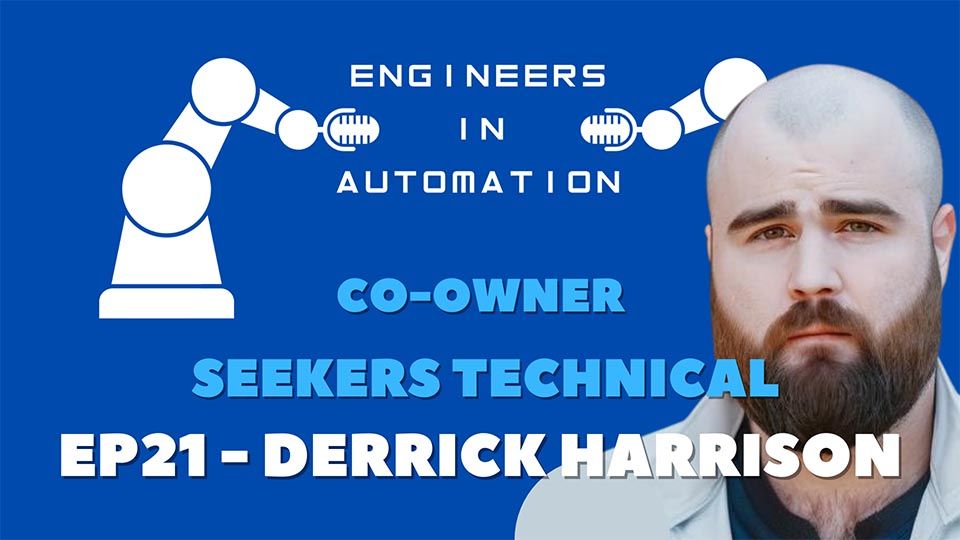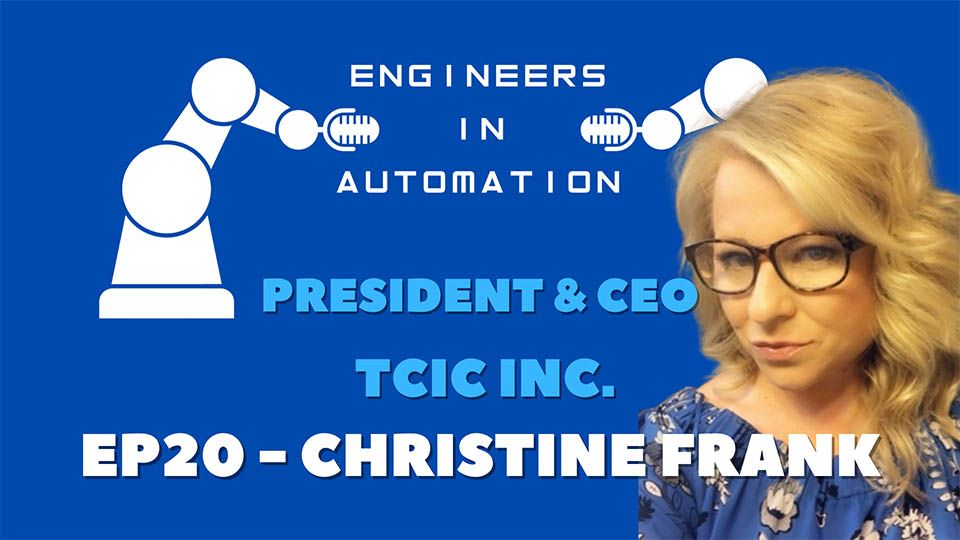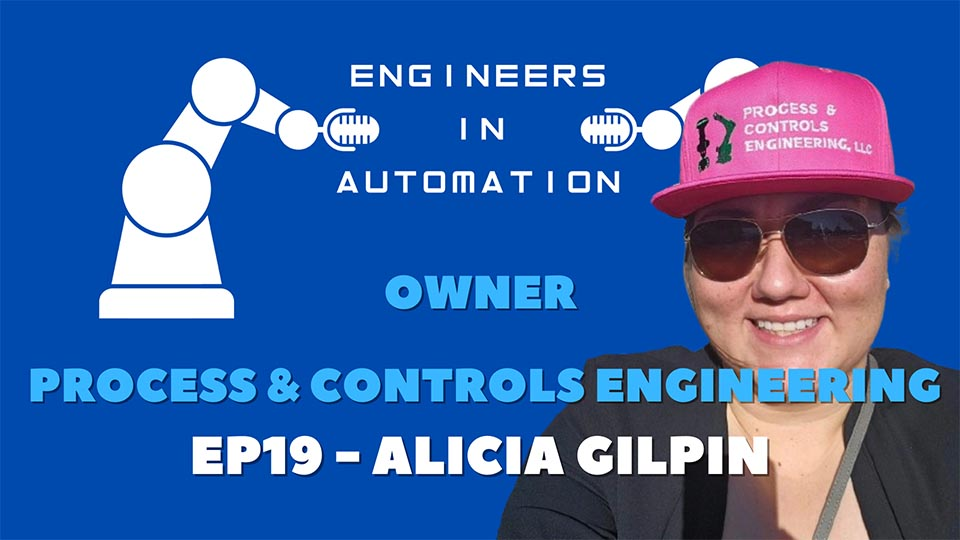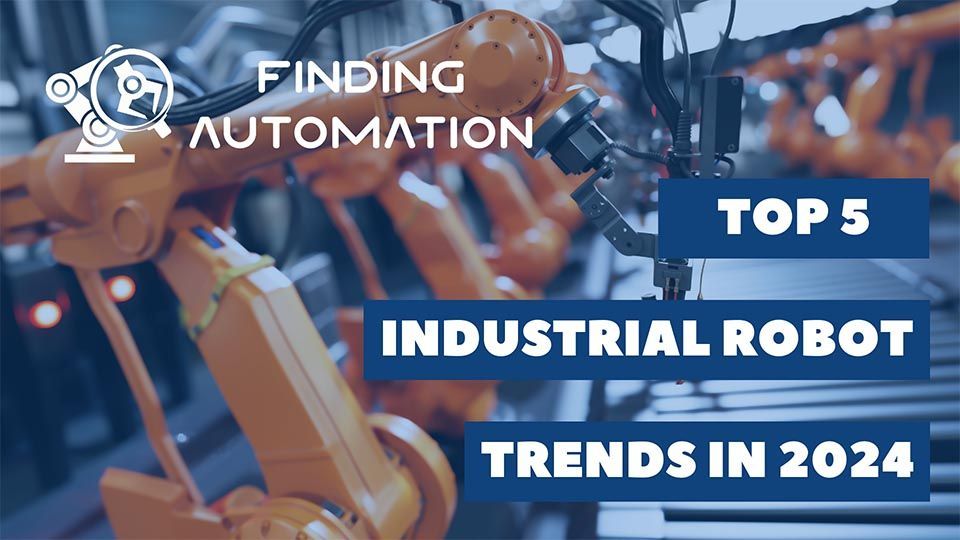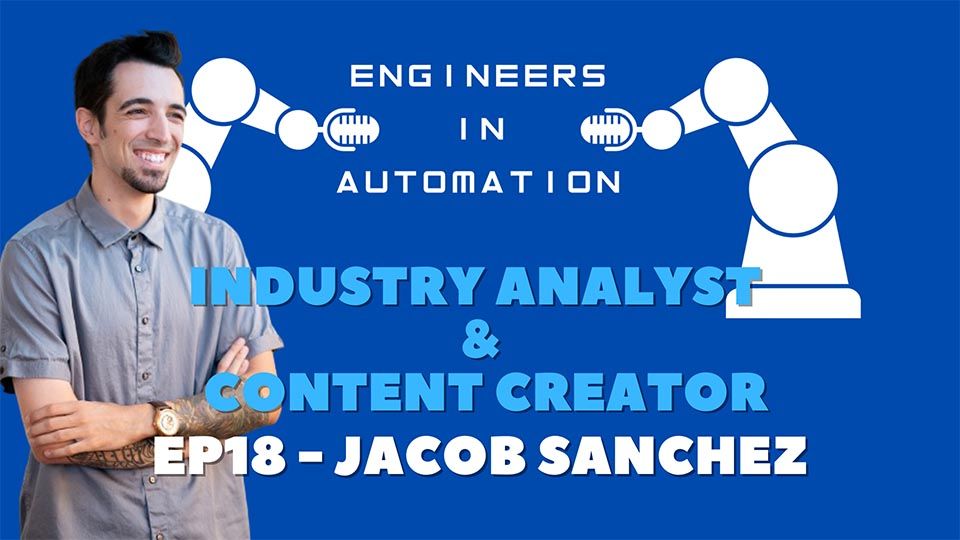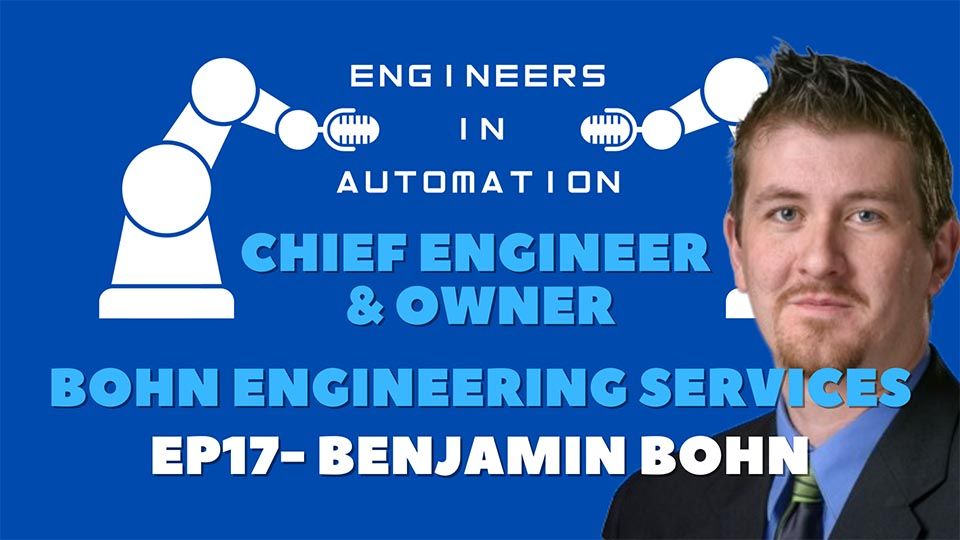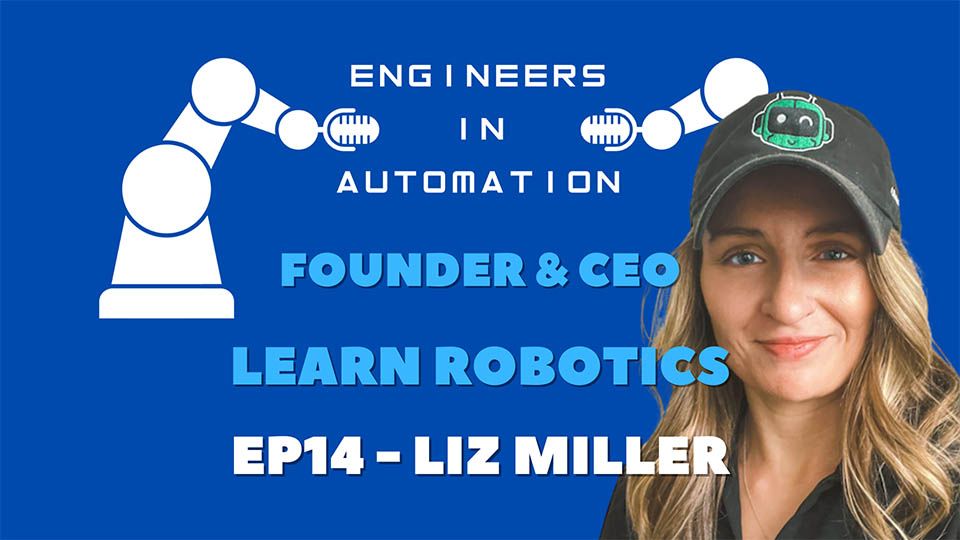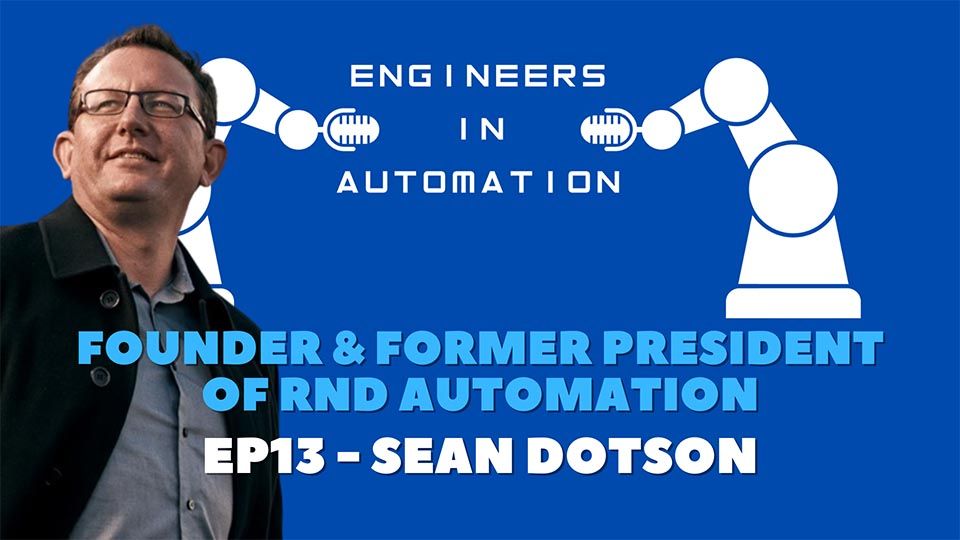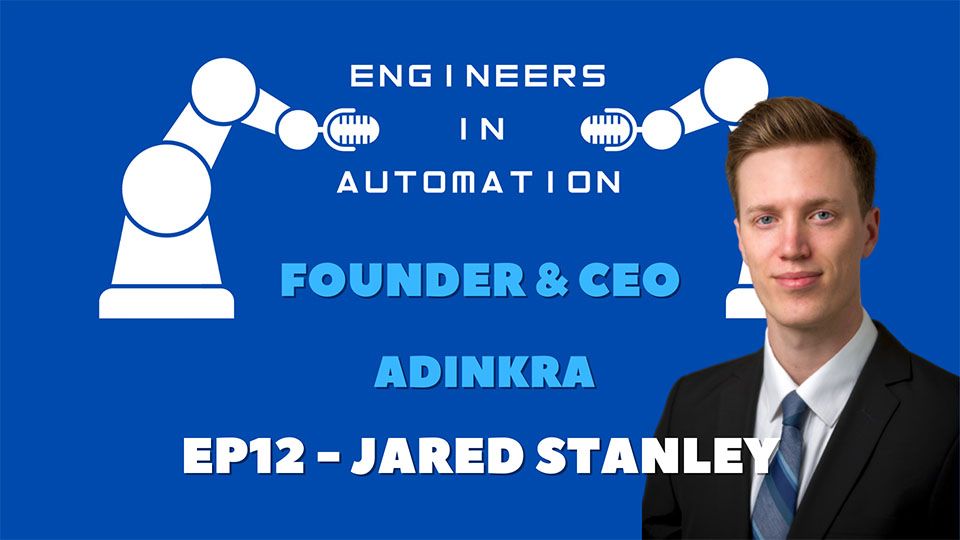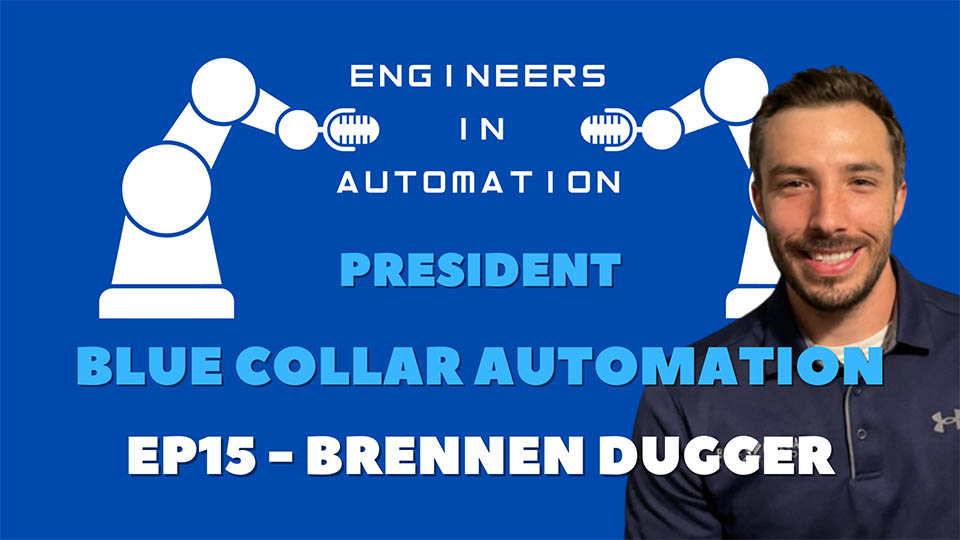Vladimir Romanov | SolisPLC
Engineers in Automation - Vladimir Romanov Episode 16
In this episode, we talk with Vladimir Romanov, the Co-Founder of SolisPLC. We discussed how running a blog and creating helpful YouTube videos then became an online PLC training company. We talk about the different types of online training programs offered and what he likes about being the owner of his own company. We also discussed how the current economic burdens affect companies' training budgets.
WATCH THIS ENGINEERS IN AUTOMATION EPISODE
Keegan Dillon – Host (KD): Hi, my name is Keegan and I'm your host of Engineers in Automation. On today's episode, we're going to be talking with Vladimir Romanov. He's the co-founder of SolisPLC. We're going to talk a little bit about his background in automation. We're going to talk about why and how he started SolisPLC. We're also going to talk about building his social media presence on YouTube, as well as some of his future goals for the business. Now let's go talk automation!
KD: Welcome to today's show. I'm here with Vladimir Romanov. He's the co-founder of SolisPLC. Vlad, welcome to the show.
Vladimir Romanov – Guest (VR): Thank you so much for having me.
Vladimir Romanov’s Automation Background:
KD: No problem. Let's just jump into it. Can you give us a little bit of background about yourself and how you got into the automation industry?
VR: Sure. So that's a really good question. I guess to take a bit of a step back, I graduated back in 2013 with an engineering electrical engineering degree from Concordia University. If anyone's familiar, that's a school in Montreal, Canada. I initially started applying pretty much everywhere. So, I moved to where my parents were at the time, which is Los Angeles. I didn't have a network. So, I started applying, you know, through the common online portals, just sending out my resume, and trying to find to be honest with you, whatever that was in electrical engineering.
And so, after a couple of months, I landed a job as a field engineer for Mitsubishi Electric doing troubleshooting of elevators and escalators, which was interesting, but I want to say, a bit more bureaucratic, then let's call it hands-on. It was a unionized environment. And ultimately, as the engineer would show up, you know, with a notepad and kind of get what happened from the installers or the mechanics, and then do a lot of paperwork. They didn't really love that position, to be honest with you.
And so while I was applying initially, I also had an interview process with Procter and Gamble. And so, the way they do it is they give you two rounds of interviews. And then, based on, I guess, how you do at those interviews, they will give you a placement anywhere in the US. And so, I ended up being invited. And that took that process, I thought, you know, that was kind of like a done deal. They didn't call me back after the second interview. But they actually reached out six months later, saying like, “Oh, now they have an opening for a process controls and information systems engineer in Auburn, Maine.”
And so, I relocated everything from Los Angeles to Maine after visiting the site, it's, it's hard to describe, right? So when I went to the manufacturing facility, it's kind of like you want to be there, you know what I mean? Like, you see the robots, you see the servos, you see the automated lines that you normally only experienced through, like how it's made. And so that's ultimately how I got into automation.
And, you know, for those listening, maybe I had zero background, I had, I didn't know what a PLC was, I had never seen, you know, a control panel of that nature. So I had, obviously the engineering knowledge that I've acquired through university, but no automation-specific skills. And so they trained me up, and they brought me up to speed, you know, with, like, senior engineers, and ultimately, I was sent to the, you know, like the five-day Rockwell training out of a facility in Massachusetts.
The Start Of SolisPLC.
KD: Wow. Yeah, that's, that's pretty interesting, and always great to get the training from the actual experts. And then also through your senior level managers and other engineers, that's a great way to learn, especially getting your hands on a product, right? So then let me ask, how did you start SolisPLC?
VR: So SolisPLC was much later and, I guess, to give you a brief timeline, so I had left P&G after three years, then moved into a role at Kraft Heinz back in Los Angeles doing more maintenance work. So, at that point, I was the maintenance manager. And so, I was exposed to a different environment than what you do in, let's say, installing control systems. Due to a merger in 2015, between Kraft and Heinz, they decided to close down with facility in 2018.
So, I ended up joining a very small systems integration firm that did a lot of consultant type of work and integration type of work for Kraft Heinz and Post Holding, so I started flying between different sites. And I want to say like living in hotels, for better for worse, I think that's the reality for, you know, many people in systems integration. But to get to your question, I started having, let's call it free time in hotels, right. So, I started to document in many ways, some of the things that I was working on in the evenings that I would come back, you know, from the facility. And because of that, I guess I created content first, you know, just like in written form. And then I had created a tutorial and a course on Udemy. And slowly but surely it started taking traction and kind of became what SolisPLC is today.
SolisPLC Business Location:
KD: Very cool. And so, is that then based in LA still, or where's the location then?
VR: So I was, so again, my home base was in Los Angeles, I was not doing many projects in Los Angeles, I was traveling a lot, primarily to Georgia, and then some facilities across the US. But Georgia was a very big hub, there's a peanut butter factory that I worked out of for almost like a year and a half. So, I would say, traveling from LA, but mostly doing a lot of the SolisPLC, we'll see if you want to call it work from Georgia.
Creating The Name “SolisPLC.”
KD: And then let me ask, I do want to know, how did you come up with the name?
VR: That is a good question. So initially, I looked for a name that was sort of like just general. And so I, I like to, I guess I look at other languages. So Solace is sort of like it's an eclipse in Latin. And it's related to the sun. And so, I just browse, like random names a lot. There's, you know, like name generators on the web. And I, honestly, like I liked because the name was fairly neutral. And what I realized is that the domain was not available.
And initially, I wanted to focus on PLCs only. And so that's maybe also like a trap for those who are listening is, you know, if you want to, let's say do integration type of work. And right now, you might be only focused on like PLC and HMIs. Don't necessarily call it PLC, because then you have that image that makes it difficult to, let's say, provide, like SCADA or any other platforms. But at the time, I wasn't necessarily thinking a lot about branding, right? Like I was just trying to put out some content out there and making sure that I provide value on the like, PLC programming side.
SolisPLC Training:
KD: Yeah, that's a great point. And that was one of the things when I did my name is I originally had in a welding and robotics was in the name and in one of the few of the ideas I had. I did the same thing was like, Okay, well, what about in the future if we branch out into different sectors or different areas? So that's also something really good to touch on? And then what types of PLCs? You know, are you doing all your trainings on? Is your one specific one, or do you guys do multiple different versions?
VR: So due to the nature of the work that I had done, it's predominantly or at least like it got started as Allen Bradley, right. So, both P&G and Kraft Heinz are fairly standardized on Rockwell, you know, from top down, it's negotiated, you know, the VP levels like way, way higher than an engineer could influence. So, it was very difficult to go outside of those boundaries.
Now, once I started working for a smaller systems integrator, there was a bit more leniency as to what kind of systems I could learn or employ. So, it started to, like, grow to a larger library. Now, you will notice, if you go to SolisPLC, it's not going to be necessarily me creating the content on each one of those platforms, we have instructors that specialize, let's call it even Siemens. So now I can program TIA Portal, but I don't have enough, let's go, I don't have 10 years of background, to be as efficient as an instructor that we have on SolisPLC. So, we have different instructors for different platforms, and we cover Siemens, PLCnext, Phoenix Contact, we cover Opto 22. We're always trying to, you know, like work on more opportunities. But those are, I want to say like at the core. And then on the robotic side, we currently only have FANUC. But we have an instructor that also knows, like KUKA, UR and a few other platforms.
SolisPLC Online Training:
KD: So, and then is that all strictly online training?
VR: Yeah, so that's a question we get a lot when companies reach out to us, I think that we try to position ourselves as online first. And the way I guess like our selling point is that it's not that it's meant to replace the in-person training, I think that you should still go through the materials with the physical hardware and software and sort of get that hands-on experience. And then we try to supplement that through online lessons. Right.
So what happens typically, and that's what happened to me, right? Like, that's why I even had the intent of building something like this because I was sent, as I said, to five days Rockwell training, and I think it was good, right? Like they explained to me like different functions, different features. And then a few weeks later, you ultimately don't get to use all of them. So, you very quickly forget, right? So we aim to be this sort of space where after you've long forgotten the training, you can go back and rewatch something that we've made available. And I think like again, we've seen this type of transformation in other industries, right like the traditional software. I think if you wanted to learn like Python, C++, Java, whatever that is, you're gonna go online. You're not going to go to sit in the classroom. So, I think that's what our goal was with SolisPLC.
SolisPLC Social Media Marketing:
KD: Well, and, and I've seen that you guys have got a pretty big following now, especially on YouTube. Do you guys upload weekly? Monthly? What's kind of your cadence there? And how do you think you establish such a large following there?
VR: Um, to be honest with you, we don't have as good of a cadence as we probably should. So as I was telling you, like, initially, when I was doing a lot of travel, I would be very diligent in publishing, I want to see like on a schedule, but even at the beginning, I think it was just like, what made sense for the listeners, but also what was I experiencing as either a problem or a necessity in the field, and I would cover that topic and release that as soon as I could, right.
And so today, I want to say we're a bit behind where we would like to be on the YouTube side, to be completely honest with you. And I guess, like, how do we figure out like, what to cover? Well, we first we go through the search terms, right, like, so if you go on YouTube, you can typically find what people are looking for. But then we also talk to engineers, primarily from our customer base, right? So we have companies that will tell us like, hey, and I'll give you like one example.
So a couple of weeks ago, we spoke to a company that's looking to extract tags from an Allen Bradley based system into a Siemens based one, right, so on TIA Portal. So, an example of that would be there's a couple of libraries that Siemens has released, that use the CIP protocol, there's an Ethernet based library. So long story short, you know, like, we figured out like, there's a need there. So we're going to create some content, both in written and video form on that topic, because we know there's a, there's a need. And it's a bit troublesome to figure it out, based on just reading the document, right.
And I think like, again, like with content, people sometimes think that maybe like, we create something out of nothing, but ultimately, a lot of the documentation is already there. Like the goal is to structure the learning and to maybe simplify access to information.
Signing Up For SolisPLC:
KD: Yeah, yeah. Good. And then how are you guys gathering new students, new people to take your training?
VR: So we do a couple of things, right. So there's obviously the audience on YouTube, when there's always you know, like a link, like go back to SolisPLC, we have more materials, we use a couple of I want to say like marketing instruments or tools, which are like a newsletter, right? So when you go to our website, you get to sign up, you ultimately get notified of new tutorials, you also get notified of new content that we've released. We also do direct outreach on the sales side, as you can probably imagine, and you probably know, on the integration side, it's very difficult to reach customers directly. But we still we still try to build those relationships. Right?
So calling an engineering manager and asking them like, well, what kind of problems are you facing with onboarding? Let's call it new engineers, new technicians, and what might they need in order to be effective at their job? Right. And so we have that approach as well, that is a little bit more I want to say like white glove, but also a little bit more challenging. From that side front, like the sales side.
SolisPLC Training Subscription Platform:
KD: Yeah, I understand that. Let me ask this. How many students do you guys currently have in your training programs? I mean, is it a continuously open door, removing people and moving them out? Or are you just slowly building and building and building?
VR: So it's, um, so we run a subscription model, right. So I think the intent is never that people will be like, retained forever. The way I wanted to structure it, even like for the, at the beginning is. I want people to be able to sort of take the shortest time that they need to learn. So the reality is, if you go online and SolisPLC, and you buy let's call it a monthly subscription, it's possible for you to finish everything we have in a month, right? It's also possible that it will take you a year.
So we have some people who have been there, you know, almost three years, and they constantly kind of real, like get the new content and they go through it. And then we have people who finish everything in a month and move on. And I think I want it to be like I said, I want there to be an incentive for them to want to keep learning.
Yeah, hence the reason like why they're paying because so and this is maybe like a slight aside when I had released some courses on Udemy. And there were like some forces I was not charging for like completely free. You know, you can go through it at your own pace. The reality is that when there's no incentive, people just don't go through it. And so, I think there needs to be this balance where you charge them a little bit, but ultimately, again, the goal is not to be like a university degree, right? Like that's gonna cost you 30 plus thousand. Like you want to make it affordable, you want to allow people to go through it at their own pace, and some people are going to stay on, like I said, three years and some, a lot of the people are going to take it for a month and then leave.
So, there's always the question of churn. And I guess like, if you want to, like discuss that a little bit, we're trying to release more content on a more diversified platform. So that let's say, if you come in with the intent of learning, let's call it Allen Bradley, or Rockwell, which let's, let's imagine you learn Studio 5000. And you learn how to program like Factory Talk View HMIs, then you're exposed also like, oh, maybe like, I want to take a look at Siemens, maybe I want to take a look at PLCnext. But it's not a necessity. Right. Does that make sense?
SolisPLC Training Levels:
KD: Yeah. Yeah. Yeah, no, interesting. It makes complete sense to me. I know there's a few others that are similar like that in the training sector as well. And I think if you price it right, I think that's definitely the way to go. Because everyone's got their own schedules, so yeah, definitely makes sense. I did want to ask, though, of these students, are you guys looking at people who, you know, that beginner that intermediate that expert level? Are you focusing just in one sector of those three, potentially?
VR: And that's a good question. Right. So, I don't think we have a very specific focus, to be honest with you, I think that a lot of the initial content was I want to say, like more intermediate, but I also think that we receive comments on both sides. Right? So and I'll explain what I mean by that is. I would put out a tutorial on I want to check PID loops, right? And then someone's going to come in and comment, well, like, “This is way too advanced. Like Vlad, you're going too fast through this.” And ultimately, is because I, you know, like, sometimes I can't put myself that well into the shoes of someone who's never seen that topic before.
And then on the flip side, you know, I'm not saying let's call it video as a given as an example, someone will come in and say like, “Well, like, you're only exploring, like the basic features of that function. I want to see the PID setup.” right? And so, it's almost like, you can't please everyone all at once. But I think if you're looking, I guess, if you're asking that question, from the point of like, we're looking to create, like more content, there's a larger audience, I think, for more basic content, but there is a, I think, like a higher impact where you create the more advanced content, right, like, so there's less competition, and ultimately, not many people like cover that.
So, I think, for the customers that we have, you know, that are working at companies and that understand like and have some engineering background, we tend to create like very advanced videos. And then let's say like for YouTube, that is like the free platform, we tend to create more like basic training that sort of serves like as a funnel, right, like, so you get some interesting information you're trying to get started in PLCs. And we want to encourage that, but then if you want to, you know, like build your career, you have a bit more like invested in the space. You’re looking for something like more solid than it's going to be, you know, like the paid and like more advanced course.
Benefits of being a business owner.
KD: And that's it, that's a great sales funnel to right there, right? You get out some of the easier stuff for free, then you turn around, okay, if you like that, you want to get a little bit more advanced. Here's, here's our platform. So great business model. Um, what do you like about being a business owner? What's some of the positives?
VR: Um, I think the biggest positive is flexibility, right, like at the end of the day, and we talked about this off stream a little bit so I now have a six-month-old and I certainly require being able to take time for her. And you know, like, as a small business owner, you can do that, right? Whereas if you're working a nine to five, it becomes very difficult obviously, it's possible depending on what you're doing, but certainly, the flexibility is, is unlike anything else when it comes to a small business and of course, you know, the expression is you eat what you kill, right?
Like so you have to sort of like work on your own contracts you need to like figure out some of the strategies and I think it's maybe it's a mistake that some business owners make where I think they're a really good experts, but then they don't enjoy those like little business aspects that come with it. But actually, like I like it, right? Like I liked interactions, I like to like be able to negotiate for myself I like to be able to decipher the world of like sales and accounting I think that is very interesting to me.
SolisPLC Students:
KD: Cool. And I do want to touch base again real quick. I forgot to ask this earlier. What about your students are a lot of them from the States, from Canada? Are you kind of reaching out globally as well?
VR: So based you know, like, again on the like a very, I want to say a good foundation on the Rockwell side. It almost like silos us to North America. So definitely, you know, like US and Canada, or I want to say are like the biggest markets. But now that we have other offerings, you know, we see people from Europe, we see people from Middle East and so, but I want to say like, predominantly it is North America.
SolisPLC Business Goals:
KD: Very cool. And since we are just now hitting Q4 here. How have you been doing this year? I mean, how is business performing? Do you set some goals for the year? Have you met those goals? How are you doing there?
VR: Um, we are always very ambitious with the goals. But I will tell you that I think the client or the economic climate on the manufacturing side is a little bit different this year than it was last year. I think that the budgets have certainly tightened up a little bit. And as you can imagine, training is not I want to say like it is a necessity, in a way, but at the same time, it is hard to say it like it's sometimes nice to have more than anything else.
KD: It seems to always get cut first, right?
VR: Exactly, exactly. So, I think a lot of companies are still automating, right, like everyone's putting new machinery on the plant floor and new robotics. But when it comes to training, the budgets are a little bit smaller. So, we've said really ambitious goals, I think we're going to be growing based on the previous year, but we're not necessarily going to be like doubling or tripling the business. So, I, you know, like I joke about this a little bit, but in a way, I have a lot more flexibility. But at the same time, you know, when I was traveling 90% of the time and working kind of 80-hour weeks as an integrator. I was making more money, right. So, I think that there is this component of reality where, depending on obviously, like what you want in life, you will have to like make different choices.
KD: Different sacrifices, right?
VR: Yes
Contact Vladimir Romanov:
KD: Yeah. And then, before we wrap up here, where can people find you? How can they get in touch with you? How can you know, visit your website? How can people reach out to you if they want some more information?
VR: Sure. So I think the easiest way if they want to reach out to me directly is going to be on LinkedIn. But then, you know, in terms of what we've discussed, so SolisPLC.com is obviously the website that I run if they want to see the kind of materials that we've put together. There's a lot of tutorials there that they can kind of browse through and read without any payments. And if they're interested in the courses, happy to chat about that.
I also, as you know, run the Manufacturing Hub podcast. And so, we do a live every Wednesday on different topics in the industry, if they want to check that out. More than happy to answer some questions. we bring in different guests as well with which we have different conversations and high-level topics on manufacturing.
KD: Yeah, great. Great. Well, thank you for being here. We'll put all that information in the description below. So go ahead and check it out. So, if you guys enjoyed today's episode, please give us a like, comment, share, and don't forget to subscribe. And we hope that you join us here next time on Engineers in Automation. Thanks!
VR: Thank you so much for having me.
If you enjoyed that podcast episode, get more information below!
CONTACT OUR GUEST:
Connect with Vladimir Romanov on LinkedIn.
Learn more about online automation training with SolisPLC.
SPECIAL THANKS TO OUR SPONSOR:
JOINER Services sponsored this episode. A platform where self-employed engineering contractors can showcase their own talents, and businesses have an opportunity to hire their services. If you want to learn more about JOINER Services and its engineering service platform for contract engineers, follow them on social media or sign-up on their website.
